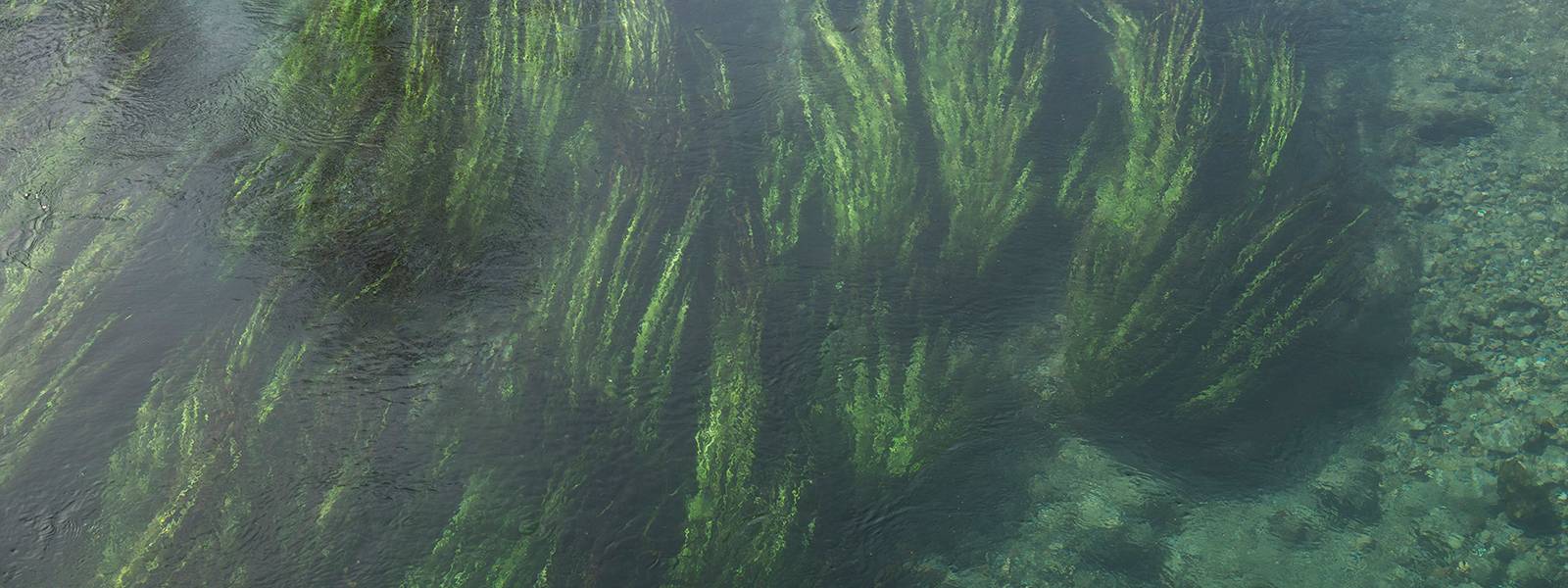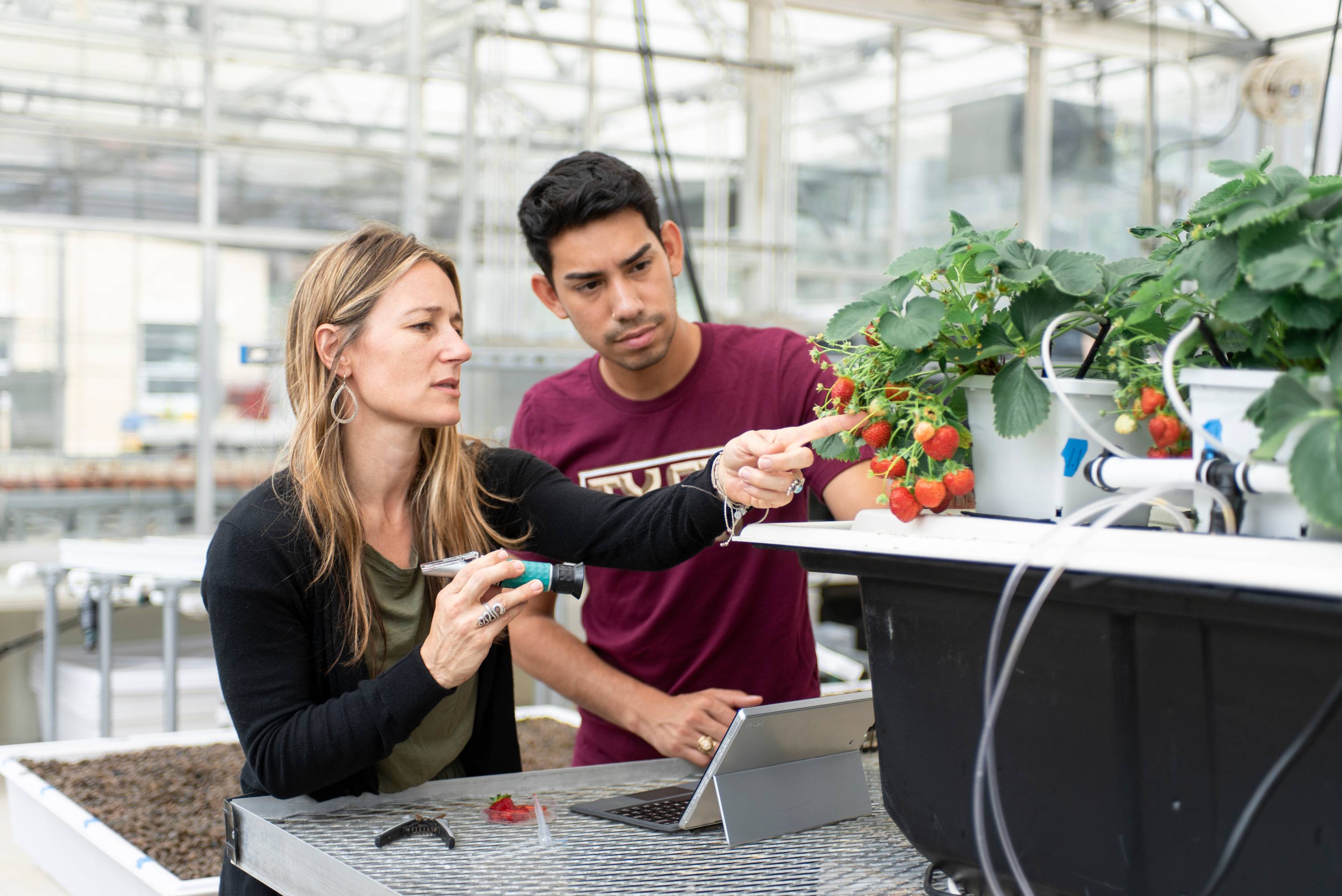Texas State University offers a variety of degrees within the field of sustainability. Through these academic programs, Bobcats will gain professional experience and field work that will enhance their sustainability knowledge and cultivate sustainable leaders.
Sustainability-Focused Undergraduate Degrees
Agriculture (B.S.A.G.)
The Agricultural Science department offers a variety of degrees and serves about 7,000 undergraduate students each year. Programs include, Agricultural Education, Agribusiness & Management, Horticulture, General Agriculture, and more.
Civil Engineering (B.S.)
Civil and environmental engineers work in a variety of career paths in both the public and private sectors, all aimed at building a safer, stronger and more sustainable world, including: Environmental Engineering, Geotechnical Engineering, Transportation Engineering, Water Resources Engineering, and more.
Anthropology (B.A.& B.S.)
The undergraduate curriculum for students seeking the B.A. and B.S. degrees in Anthropology is structured to ensure that all students receive the knowledge to achieve the educational outcomes prescribed by the faculty, as well as allow for flexibility in training so that the personal goals of each student is achieved.
Environmental Engineering Technology (B.S.T.)
Engineering Technologists are involved in different professional activities such as planning production processes, establishing quality assurance procedures, cost analysis, developing safety programs, designing facilities, and implementing lean principles. The Environmental Engineering Technology program focuses on a variety of engineering techniques and provide courses such as Environmental Engineering, Design for the Environment, Air Pollution Management and more.
Applied Sociology (B.S.)
Sociologists study society with the goal of creating a better world. Sociology majors study topics such as sexuality, mental health and addiction, aging, food and society, immigration, criminology, the family, and sustainability. Students also develop the research and critical thinking skills needed to confront social problems.
Geography and Environmental Studies (B.A. & B.S.)
The mission of the Department of Geography & Environmental Studies is to provide its students with educational experiences of the highest quality, to conduct vital research that benefits society, and to serve our communities, from the local to the international. Undergraduate degrees include Geographic Information Science, Geography, Resource and Environmental Studies, Urban and Regional Planning, Water Resources, and Physical Geography.
Biology (B.S.)
Biology is the study of living systems and how they function. Basic knowledge of biology is fundamental to many human endeavors from medicine to agriculture to natural resources management to environmental protection. The Biology department offers several undergraduate degrees such as Aquatic Biology (B.S.), Wildlife Biology (B.S.), and Biology (B.S.).
Sustainability-Focused Minors
The Sustainability Studies minor requires 18 semester credit hours. Sustainability Studies examines the human dimensions of the environment and sustainability in an interdisciplinary context.
Sustainability-focused undergraduate minors include; Agriculture, Biology, Environmental Studies, Honors Studies, Horticulture, Nature and Heritage Tourism, Peace and Social Justice, Plant and Soil Science, and Women's Studies.
Sustainability Studies Master's Program (M.A. & M.S.)

Sustainability is central to nearly every professional field, from developing clean energy to protecting our natural resources to meeting the many challenges of urbanization and population density. Whether your interests tend toward technology and engineering, the humanities and leadership, or the natural sciences, our interdisciplinary Sustainability Studies master’s degree program opens a host of career paths designed to meet the challenges of our rapidly changing world. You can be a part of finding solutions today for the future's biggest challenges.
Other Sustainability-Focused Master's & Doctoral Programs
Agriculture; Integrated Agricultural Sciences (M.S.)
By integrating animal science, plant and soil science, agricultural economics, and agricultural education into one program, students experience a transdisciplinary approach to research and education concerning land-use strategies, crop and animal production, distribution, sales, economics, policy, and the environment. Students may pursue a Master of Science in Integrated Agricultural Sciences.
Geographic Information Science (M.A.Geo. & Ph.D.)
Working closely with a dedicated faculty that is recognized nationally and internationally for its research, mentoring, and teaching accomplishments, students embark on a journey of professional development that includes research and teaching opportunities. The department also hosts or plays key roles in several international, national, and university-wide research centers. The M.A.Geo program provides students with the skills and knowledge needed to solve real-world problems with a geographical dimension. The curriculum for the Ph.D. program in geographic information science (GIS) is designed to provide depth and breadth of knowledge in the field’s theoretical foundations and research methods.
Public Administration (M.P.A.)
Public administration faculty have been recognized nationally for their contribution to outstanding teaching, research, and service. The faculty leads practical research projects to inform public management and public policy in the region. The Master of Public Administration (M.P.A.) program is accredited by the Network of Schools of Public Policy, Affairs, and Administration (NASPAA).
Anthropology (M.A. & Ph.D)
The Department of Anthropology at Texas State offers a comprehensive curriculum, national and international fieldwork opportunities, dedicated archaeological and forensic research centers/laboratories, and community-based cultural anthropology research projects. The two-year master of arts (M.A.) program in anthropology emphasizes a holistic approach to the anthropological domains. Anthropology doctoral students graduate with methodological and theoretical foundations to conduct applied research in a variety of settings.
Geography (M.A.Geo. & M.S. & Ph.D.)
The M.A.Geo and M.S. programs provide students with the skills and knowledge needed to solve real-world problems with a geographical dimension. The Master of Applied Geography (M.A.Geo) with a concentration in Geographic Education is the only master's program in the Department of Geography that is offered 100% online. The Ph.D. program in geography is designed to provide depth and breadth of knowledge in the field’s theoretical foundations and research methods.
Sociology (M.A. & M.S.)
Sociology offers a wide range of career possibilities since concerns over issues like the environment, urban development, health, aging, and a competitive global economy have increased the demand for social scientists and trained evaluators. The Department of Sociology provides curriculum and training to prepare students to meet this need.
Aquatic Resources (M.S. & Ph.D.)
The Aquatic Resources Master's program is a multidisciplinary program of study and research based on aquatic sciences and aquatic resource management. Within the Aquatic Resources and Integrative Biology Doctoral program students will learn to integrate scientific, technical, and socioeconomic elements to provide sustainable aquatic resources from local to international levels.
Natural Resources & Environmental Studies (M.A.Geo.)
The M.A.Geo program provides students with the skills and knowledge needed to solve real-world problems with a geographical dimension. The Master of Applied Geography (M.A.Geo.) degree with a major in Natural Resources and Environmental Studies requires 33 semester credit hours. Students who do not have the appropriate background course work may be required to complete leveling courses.
Wildlife Ecology (M.S.)
The Wildlife Ecology M.S. program at Texas State University has a long history of interagency cooperation with Texas Parks and Wildlife Department and the U. S. Fish and Wildlife Service. Students have been supported financially in research by interagency contracts and many graduates of Texas State are employed by these agencies. Cooperation with these agencies has allowed students on the cutting edge of wildlife research in the state.
Biology (M.A. & M.S.)
The Biology Department offers students opportunities to study in the field or in modern facilities with up-to-date instrumentation and resources, including a DNA-sequencing unit, an integrated microscopy facility, high-speed digital networks and computing centers, a GIS lab, greenhouses, wet labs, and extensive plant, animal and paleobotanical collections. Students may pursue either a Master of Arts or Master of Science degree.
Population and Conservation Biology (M.S.)
The M.S. with a major in Population and Conservation Biology is a research degree that requires a minimum of two years full-time coursework and research leading to a thesis. The program is envisioned as an interdisciplinary course of study that combines principles of population biology with strong training in measurement and analysis of biological systems, augmented with the student’s choice of study in particular specialties.
Sustainability Graduation Cord
Be recognized for your sustainable achievements and contributions by applying for the Sustainability Recognition Graduation Cord.
Environmental Service Fee
University students, faculty, staff, alumni or members of the San Marcos Community may apply for funding for a project, improvement or event.







